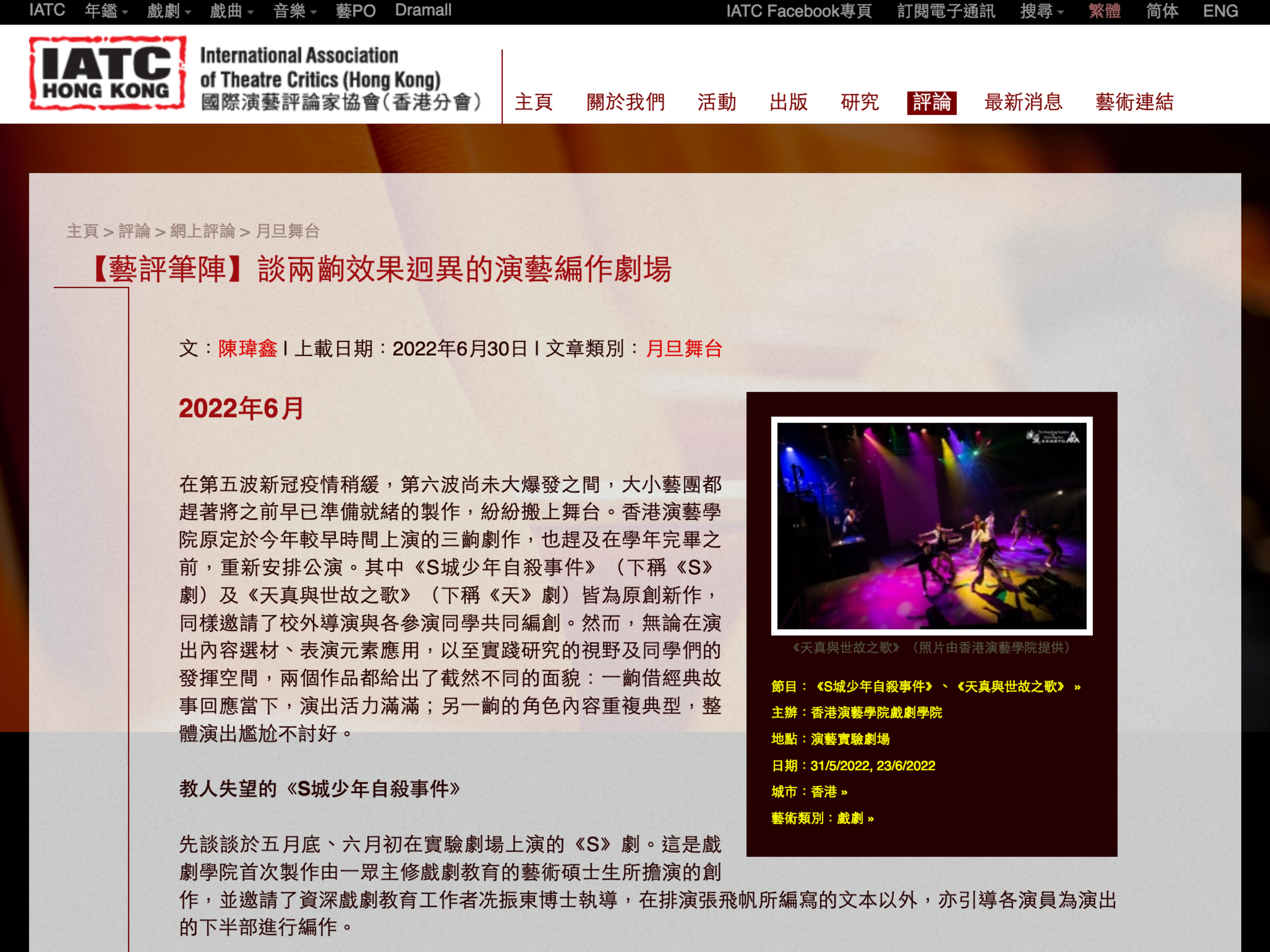
Songs of Innocence and Experience (IATC Review)
Two very different original theatre performances
Disappointing The "S" Tragedy
Let's start by discussing the play "S," which was performed at the experimental theater at the end of May and the beginning of June. This was the first production by the Drama School performed by a group of postgraduate students majoring in drama education. They invited experienced drama education practitioner Dr. Sin Chun-tung to direct the play. In addition to rehearsing the text written by Cheung Fei-fan, the director guided the actors in co-creating the second half of the performance.
The story revolves around a high school student named K, who has weaker learning and communication abilities but is particularly sensitive to biological information (possibly a student with special learning needs or Asperger's syndrome?). The play explores the attitudes and reactions of different people around K before and after he jumps off the school rooftop to commit suicide. The first act of the play is a whimsical adventure imagined by K, while the second act focuses on an investigation conducted by a parent who is a police officer, revealing the harsh reality of the world. In the director's note in the program, he mentioned that he wanted to present "a professional performance about education... with the goal of diverse learning through the art of drama." Therefore, it is easy to see that the director used a magical realistic style in the first act and incorporated mask performances in the second act. He also deliberately arranged for half of the 12 actors to play different roles in the first and second acts, clearly intending to provide these students with the opportunity to experience different perspectives and bring about more self-reflection and introspection.
This goal is indeed commendable conceptually, but there seems to be a significant gap in execution. After all, these students have not received extensive and comprehensive performance training, and asking them to analyze and portray characters with backgrounds significantly different from their own age is already challenging, let alone wearing masks and relying solely on voice and physicality to handle the changes. Therefore, their performance lacks professionalism. As for the content created by the actors in the second act, it merely continues or responds to the character settings in the first act and remains superficially stereotypical, without bringing about more imagination and insights into "education." It is regrettable that as a postgraduate performance, based on the nearly two hours of presentation on stage, we not only fail to see their true learning outcomes but also expose their shortcomings.
At the end of the play, a dance is deliberately added, with all the actors wearing school uniforms and dancing to Twins' famous song "明愛暗戀補習社" (Bright Love, Dark Crush Tutorial Center). Although some actors seemed to enjoy it and were immersed in the dance, I also saw several older students struggling to keep up with the rhythm... As an audience member at that moment, I couldn't help but ask: Does rehearsing this song and dance really help us understand "what education is?" or gain insights into the confusion and thoughts that young people are facing? Or perhaps the answer was already hinted at in the main visual of this play's promotion, the blood-red "Fail" stamp placed below the title.
Songs of Innocence and Experience
After more than two weeks, in another production at the same experimental theater, we finally got to see the professional and diverse results of drama education within our college. I'm referring to the play "Innocence" created and led by the co-founders and co-artistic directors of "Rooftop Productions," Michelle Li and Ivor Houlker, along with ten undergraduate students from the second to fourth year of the Drama school, as well as a live band composed of four first-year students. Together, they spent nine months collaborating on this production.
This new work follows in the footsteps of Rooftop Productions' previous performances. Just like "The Furies Variations," which used ancient Greek tragic texts and philosophical classics as a blueprint, incorporating personal sharing by the actors and live rock music performances, the play "Heaven" narrates and interprets segments of the epic poem "Paradise Lost" by John Milton, as well as the life of the author himself. It also features live music performances and includes personal experiences shared by the main actors, as well as extended reflections on the themes of the play. The incorporation of various visual elements, especially real-time video projections and stories of non-Chinese individuals growing up in Hong Kong, also echoes the previous work Testimony.Although the framework and presentation techniques may seem lacking in novelty, the two directors made good use of the technical support and human resources typically available only in academia for this production. It provided ample room for both drama school students and those studying stage and production arts to showcase their talents. For instance, the real-time video recording transmitted to a high-definition LED screen positioned at the center of the stage or the projection of actors' shadows onto the background images required precise calculations in advance. The adjustments made during the live performance experiments were also crucial. If the production had only a few days of rehearsal time, it might not have achieved perfection. Additionally, each actor not only played their own roles and characters within the story but also showcased various talents such as playing musical instruments, martial arts, and rap, demonstrating their diverse skills.
However, what impressed me the most was the clever selection by the two directors of the storyline concerning the fallen angel Satan (Lucifer) in "Paradise Lost." It portrayed Satan's rebellion and betrayal against God's tyranny, along with the themes raised by the author Milton in his work "Areopagitica," which questioned issues of freedom of publication. These elements guided both the young actors and us, the audience, to reflect on personal growth and transformation, and how to confront authoritarianism while struggling between rebellion and acceptance, all while maintaining the innocence and ideals of youth. In the current global climate of extreme politics and the constant spread of white terror, such sincere and thought-provoking creations are even more valuable.
Moreover, "Innocence" aptly showcased the liveliness and high energy of this group of young actors. The play began and ended with song and dance, accompanied by real-time broadcast of Japanese anime-style captions and scrolling lists, bringing a playful and passionate balance to the weighty themes. Of course, if I were to nitpick, I would say that during the actors' personal storytelling moments, some performances felt a bit contrived and lacking sincerity. However, it is not easy to perform in close proximity to the audience in an experimental theater, to portray oneself and tell one's own story while jumping between different characters, and to coordinate with other stage elements. Overall, the performance of these students was already quite remarkable.
In conclusion, as the saying goes, "without comparison, there is no harm." I understand that directly comparing these two productions is unfair, as they differ in terms of professionalism and nature. However, if we were to evaluate the level of the newly established majors in our college, namely Applied Theatre and Dramaturgy, based on the achievements of these two productions, there is no doubt about the latter, but the former is a cause for concern. While "Innocence" arranges post-show discussions after every performance to communicate and share with the audience, there is no such interaction observed after "S," which mainly consists of presentations sharing teaching plans and research findings by graduating students in drama education. It is necessary for the faculty members of the college to reflect on which aspect of "education" has encountered issues.
Note: This is an unofficial English translation of the original monolingual Chinese article.Gallery
Originally published in: IATC (HK). We create a mirrored version of reviews and articles about our shows for archival purposes, so that we can retain a version if the original disappears. We always link to the original publisher and credit the author. However, if you are the owner of this material and you would like us to remove it, please get in touch.

